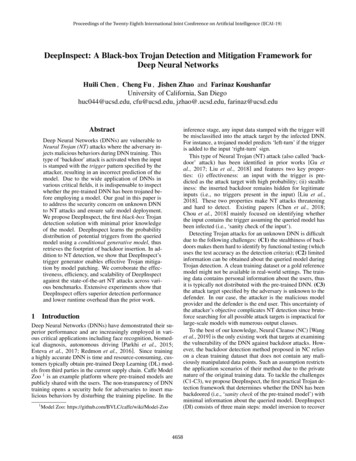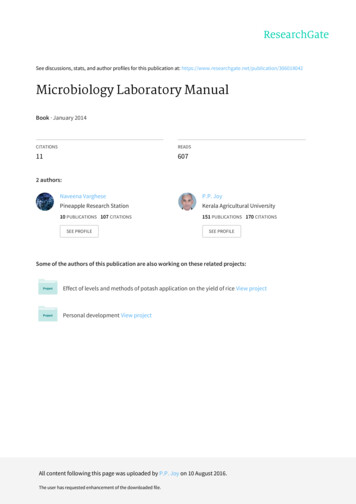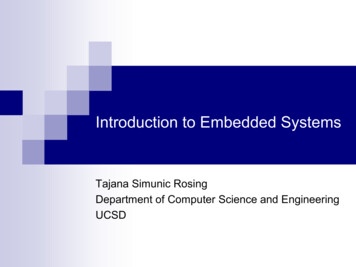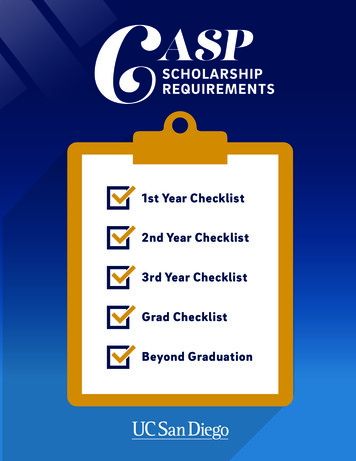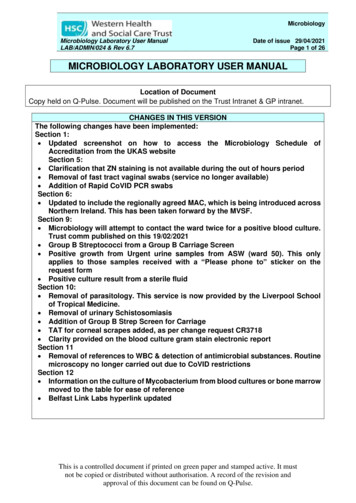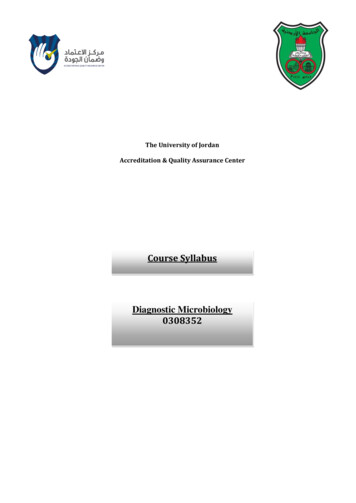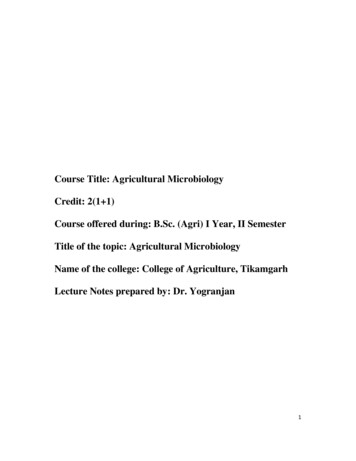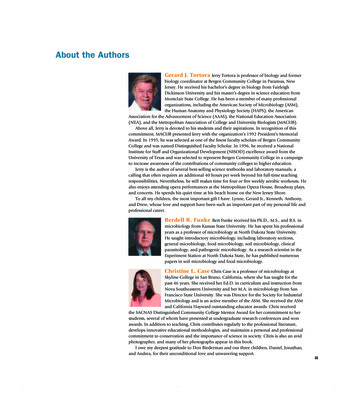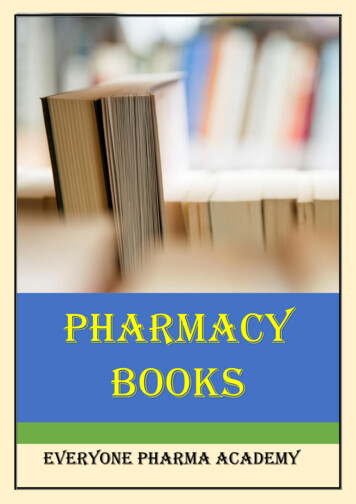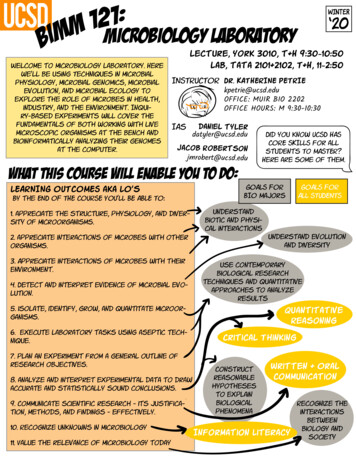
Transcription
UCSDwinter‘20microbiology laboratoryWelcome to microbiology laboratory. Herewe’ll be using Techniques in microbialphysiology, microbial genomics, microbialevolution, and microbial ecology toexplore the role of microbes in health,industry, and the environment. Inquiry-based experiments will cover thefundamentals of both working with livemicroscopic organisms at the bench andbioinformatically analyzing their genomesat the computer.lecture, york 3010, t&H 9:30-10:50lab, tata 2101&2102, T&H, 11-2:50INSTRUCTOR Dr. KATHERINE PETRIEkpetrie@ucsd.eduOFFICE: MUIR BIO 2202OFFICE HOURS: M 9:30-10:30IAsdaniel tylerdatyler@ucsd.eduJacob Robertsonjmrobert@ucsd.eduDid you know UCSD HASCORE SKILLS for allstudents To MASTER?Here are some of them.What this course will enable you to do:LEARNING OUTCOMES aka LO’sBy the END OF THE COURSE YOU’LL BE ABLE TO:1. appreciate the structure, physiology, and diversity of microorganisms.GOALS FORBIO Majorsunderstandbiotic and physical interactions2. appreciate interactions of microbes with otherorganisms.3. Appreciate interactions of microbes with theirenvironment.4. Detect and interpret evidence of microbial evolution.7. plan an experiment from a general outline ofresearch objectives.8. analyze and interpret experimental data to drawaccurate and statistically sound conclusions.9. Communicate scientific research - its justification, methods, and findings - effectively.10. Recognize unknowns in microbiology11. Value the relevance of microbiology todayunderstand evolutionand diversityuse contemporarybiological researchtechniques and quantitativeapproaches to analyzeresults5. isolate, identify, grow, and quantitate microorganisms.6. execute laboratory tasks using aseptic technique.GOALS FORALL STUDENTSQuantitativeReasoningCritical ThinkingConstructreasonablehypothesesto explainbiologicalphenomenaWritten & OralCommunicationInformation LiteracyRecognize theinteractionsbetweenbiology andsociety
UCSDwintermicrobiology laboratoryHow WILL YOUdemonstrate thatyou accomplishedthe 11 Lo’s?‘20Assessments and basis for final grade:AssessmentweightIn-Lecture CLICKER QUESTIONS10 %packback participation10%notebook checks6%practical2%effective paraphrasing homework2%microbial zoo5%Microbes & health lab reports20 %microbes & industry lab report10 %microbes & Environment Presentation5%For reportguidelines & rubrics,stay tuned totriton Ed!midterm exam10 %final exam20 %No bell curve:you won’t becompetingagainsteach other!.GRADING 7360-70 60A AAB BBC 1.0)(0)Materials needed to succeed:A Clicker:via Canvas.for lecture, you are required to have and bring an i clicker That is registeredlab Manual:physical copy, available from the bookstore ( 28), ISBN: 9781533901750Packback access code:we’ll be using this AI-moderated forum to dive deeper intothe topics we cover in class. You’ll need to purchase an access code, ( 28), available fromthe bookstore website (Look up BIMM 121 under ‘textbooks’).PPE:a lab coat that you only use for this class that extends to your knees, safetyglasses (regular prescription glasses aren’t sufficient).lab notebook:bound style, with carbonsCanvas: Grades, and other course information will be posted on Canvas, so make sureyou can access it via coursefinder.ucsd.edu.something to take notes with During Lecture:research shows that pen & paper note-taking is best.Lectures will be podcast, but
UCSDmicrobiology laboratorywinter‘20How to succeed in this class:DAILY Clicker Questions (10% of grade):Lectures will start with a BRIEF clicker ‘quiz’ on the basic details for the upcoming lab. Ifyou‘ve read the lab manual pages for the next lab session, you should be able to answerthese questions. After that, there will be Clicker questions throughout the lecturethat Will challenge you to apply what you’ve just leanred. For this second type, You willusually have the opportunity to collaborate with your neighbors.Every day you will have the opportunity to earn:2 participation points (Submit answer to 75% of ALL questions for 2 Pts, else Get 0/2)3 Performance Points (Get 1 pt for every Correctly answered question)There are usually more than 3 clicker questions per class, so even if you get somewrong you may still get full points.if you miss lecture.Packback (10% of grade)If You miss Lecture, or if your clicker ishaving technical difficulties, you may Notmake up the questions. However we’ll dropyour lowest 4 clicker days.This ai-moderated discussion forum is a keylearning tool for the class. It is driven byyour curiosity and will help you make connections between what we learn in classand the real world.If you miss the midterm, your final will beworth a bigger % of your grade to compensate. If you miss the final, You may be eligible for an incomplete.Use these drops wisely: It’s better tosave them for the unexpected.if you miss lab.you must let dr. Petrie, Your IA, & your groupknow ahead of time. you will still be responsible for what you missed. in the case of repeated absences, you may be asked to provide documentation. absences due to scheduling conflicts (other coursework, vacations, Lizzoconcerts, etc) will not be excused and Eachwill result in a penalty (1 % off overall grade).Every week, you are required to:make 2 posts, at least 1 ofwhich must be a responseto earn credit, your posts must meet certain guidelines. Packback will assign a curiosity score to each post based on itsdepth, credibility, and presentation. consistently High curiosity scores are an opportunity to earn extra credit. You can miss 2packback weeks.If Health orfamily emergenciesmake you miss too much,seeDr. Petrie to discussThe possibility of annotebook checks (6% of grade)“Incomplete”. Per UCSDthere will be weekly In-Lab checks of your lab notebook. thePolicy, Your grade mustguidelines for how to keep your notebooks are in the lab manual.Be in good standingOne thing that will help you ensure you get full credit is toto be eligible.answer all questions Listed in the manual
UCSDmicrobiology laboratoryInclusivity:‘20Academic integrity:Everyone will come to this course withdifferent backgrounds, knowledge, andperspectives. We want to create aclassroom culture that respects andrevels in this human diversity. If youhave any concerns related to inclusivity or feel your identities (Race, Gender,sexuality, religion, ability, etc) are notbeing honored, please let us know!Accommodations can be made for students with a letter from the OSd.For more information on campus & community resources, check canvas.Regraderequests:winterAn Inclusive environment is one whereeveryone has an equal opportunity tosucceed. Academic dishonesty (Including, but not limited to: Cheating, plagiarizing, answering with someone else’sclicker) fractures The playing field, bygiving some students an unfair advantage. Assignments will be monitored viaTurn-it-in, and students found to havecommitted academic dishonesty will bereferred to the UCSD academic integrityOffice and may receive a failing gradefor the course.WE All make Mistakes. If you think your Homework, worksheet, report,or Exam was Graded in Error, submit a request by email to Dr. Petriewithin 7 days of receiving your grade. include a written description ofthe error, Including which question you are concerned about and whyyou think the grade is mistaken. No in-person requests will be considered. The regrade option is to safeguard you from genuine mistakes ingrading; there is no guarantee you score will go up.We’re working to improve your educational experience:Did you knowthat you canbe part of aResearch studyin this class?No! Not Like that! Instead, duringThis class, I’ll be working to figureout the Most Effective teachingmethods for your learning. ThisMeans you might do surveys andprovide feedback. For more information, please read the opt-out formhanded out in class or on canvas .
fallCourseschedule(Tentative):Microbiology laboratory‘19microbes andmicrobes and health microbes and industry the environmentweek 2.week 1.UCSDT LECT. (1/7): intro to courseT lab. (1/7): Lab 1H lect. (1/9): cultures, colonies,& microscopyPlease remember that your work inlecture (clickers) will be graded, sobe sure to show up!H lab. (1/9): Lab 2T LECT. (1/14): biofilms & dilutions 1g HWparaphrasindue 1/14!T lab. (1/14): LAb 3H LecT. (1/16): cell appearance &dilutions 2H lab. (1/16): LAb 4g HWparaphrasine 1/21!udsnoisivretHe lab practical is a graded observation of your lab skills. makesure you get in lots of practiceby sharing the work with yourpartner in weeks 1 &2. while you’rewaiting your turn, you can work onyour microbial zoo.week 3.T lect. (1/21): microbial genomesT lab. (1/21): Lab 5H lect. (1/23): Illumina sequencingH lab. (1/23): lab 6, lab practical/23practical! 1
winterCourseschedule(Tentative):Microbiology laboratory‘20microbes andmicrobes and health microbes and industry the environmentweek 6.week 5.week 4.UCSDT LECT. (1/28): (more) illumina sequencingT lab. (1/28): Lab 7H lect. (1/30): midterm!!!!!midterm1/30!H lab. (1/30): lab 81 duetrapbalmbiofilPM95:114/2TueT LECT. (2/4): fermentation &differential id 1T lab. (2/4): Lab 9H lect. (2/6): PCRH lab. (2/6): lab 10T lect. (2/11): discuss DNAlibrary poolT lect. (2/11): natural crisprT lab. (2/11): pool &submit illumina sequencing (planned)T lab. (2/11): lab 11H lect. (2/13): Known crisperloci in L.A.B., differential id 2H lab. (2/13): lab 12see classwebsite forlab reportguidlines.!
UCSDMicrobiology laboratoryweek 7.microbes and healthoomicrobial z:59 pm1181/2eudue TCourse schedule (Tentative): winter‘20microbes andmicrobes and industry the environmentT LECT. (2/18): sanger sequencingT lab. (2/18): lab 13H lab. (2/20): lab 14week 9.week 8.T lect. (2/25): photosynthesisand tolerance to changeT lab. (2/25): lab 15T lab. (2/25): lab 15H lect. (2/27): BLAST, CRISPRsand the microbiomeH lab. (2/27): lab 16H lab. (2/27): lab 16T lect. (3/3): Analyzing Illuminasequence dataT lab. (3/3): lab 17H lect. (3/5): final reviewH lab. (3/5): lab 18T lab. (3/3): lab 17duetroperbalyogurt9 PMfri 3/6 11:5H lab. (3/5): lab 18
winterCourseschedule(Tentative):Microbiology laboratory‘20microbes andmicrobes and health microbes and industry the environmentweek 10.UCSDT lect. (3/10): Presentations!!T lab. (3/10): Lab 19H lect. (3/12): final!!H lect. (3/12): final!!H lab. (3/12): Lab 20Final!2 duetrapbalmbiofil9 PM5:1171/3sTueFinal!that’s duringfinals week.!H lect. (3/12): final!!Final!
170886Human ResearchProtections ProgramApprovedCurrent Approval:Do not use afterPages 306/06/201907/03/2020University of California, San DiegoConsent to Act as a Research SubjectInvestigating the Impact of Pedagogical Choices on University Student Learning andEngagementWho is conducting the study, why you have been asked to participate, how you were selected,and what is the approximate number of participants in the study?Gabriele Wienhausen, Director of the Teaching and Learning Commons, together with hereducation research colleagues is conducting a research study to find out more about howpedagogical choices affect student learning and experience in the classroom. You have beenasked to participate in this study because you are a student in a class that is being studied or usedas a control. There will be approximately 500,000 participants in this study.Why is this study being done?The purpose of this study is to create knowledge that has the potential to improve the learningand educational experience of students at UC San Diego and beyond.What will happen to you in this study and which procedures are standard of care and whichare experimental?If you agree to be in this study, the following will happen: Your data from this class including grades, homework and exam submissions, and surveyresponses will be included in the analysis to determine the effectiveness of thepedagogical techniques used in this course compared to other similar courses.How much time will each study procedure take, what is your total time commitment, and howlong will the study last?Your participation involves only agreeing to let us use your data in our analysis. It will requireno time on your part above the time you put into this course without agreeing to the study.What risks are associated with this study?Participation in this study may involve some added risks or discomforts. These include thefollowing:1. A potential for the loss of confidentiality. We will not share your personally identifying data withpeople outside our research team. Data will only be kept in anonymized form for research purposes.Course data will not be used for this research study until after final grades have been posted and will berendered confidential by removing any identifiers before analysis. Your instructor will not know whetheror not you are participating in this study until after final grades have been posted. Data from studentswho opt out of the study will be removed prior to data analysis. Research records will be keptconfidential to the extent allowed by law. Research records may be reviewed by the UCSD InstitutionalReview Board.
170886Since this is an investigational study, there may be some unknown risks that are currentlyunforeseeable. You will be informed of any significant new findings.What are the alternatives to participating in this study?The alternatives to participation in this study are not to participate. If you choose to opt-out ofparticipating in this research study, we will exclude your data from analysis. Whether youparticipate will have no impact on your experience or grade in the associated class as theprofessor will not know who is or is not participating in the study until after final grades areassigned.What benefits can be reasonably expected?There is no direct benefit to you for participating in the study. The investigator, however, maylearn more about how to improve student learning, and society may benefit from this knowledge.Can you choose to not participate or withdraw from the study without penalty or loss ofbenefits?Participation in research is entirely voluntary. You may refuse to participate or withdraw orrefuse to answer specific questions in an interview or on a questionnaire at any time withoutpenalty or loss of benefits to which you are entitled. If you decide that you no longer wish tocontinue in this study before the end of the quarter, simply respond to the online opt-out formhere: https://goo.gl/forms/JSBRjEmkES6W6xYc2. If you decide to opt out after the quarter hasended, you must contact Laurel Nelson (laureln@ucsd.edu) and give the quarter and the coursefrom which you would like your data withdrawn.You will be told if any important new information is found during the course of this study thatmay affect your wanting to continue.Can you be withdrawn from the study without your consent?The PI may remove you from the study without your consent if the PI feels it is in your bestinterest or the best interest of the study. You may also be withdrawn from the study if you do notfollow the instructions given you by the study personnel.Will you be compensated for participating in this study?You will not be compensated for participating in this study.Are there any costs associated with participating in this study?There will be no cost to you for participating in this study.Human ResearchProtections ProgramApprovedCurrent Approval:Do not use after06/06/201907/03/2020
170886Who can you call if you have questions?Gabriele Wienhausen and/or her colleague has explained this study to you and answered yourquestions. If you have other questions or research-related problems, you may reach GabrieleWienhausen at gwienhausen@ucsd.edu or (858) 534-3958.You may call the Human Research Protections Program Office at 858-246-HRPP (858-2464777) to inquire about your rights as a research subject or to report research-related problems.Your ConsentIf you consent to participate in this study, no action is needed. If you DO NOT consent toparticipate in this study, or you choose to opt-out at any time during the quarter, please submitthis form online . Your instructor will not have access to the list of students who opted outuntil after grades are posted. Note that you must separately opt-out of the study for each courseinvolved in this study.[ ] I am not 18 years or older or I do not consent to anonymized research use of my data from thecourse specified below.Course name:Course section number:Term:Name:PID:Human ResearchProtections ProgramApprovedCurrent Approval:Do not use after06/06/201907/03/2020
microbiology laboratory winter UCSD '20 INSTRUCTOR Dr. KATHERINE PETRIE kpetrie@ucsd.edu OFFICE: MUIR BIO 2202 OFFICE HOURS: M 9:30-10:30 Welcome to microbiology laboratory. Here we'll be using Techniques in microbial physiology, microbial genomics, microbial evolution, and microbial ecology to explore the role of microbes in health,
